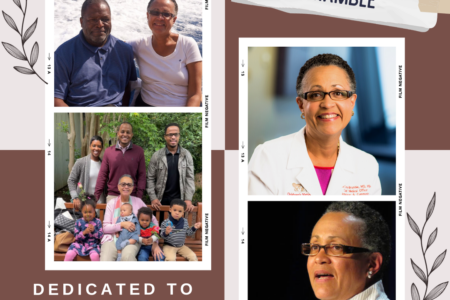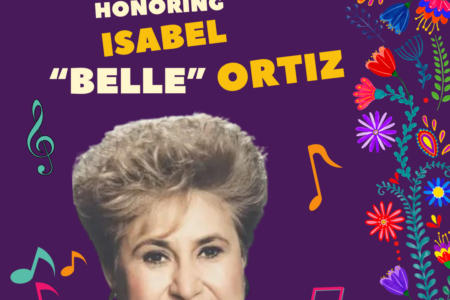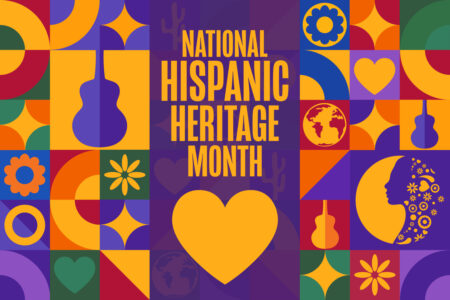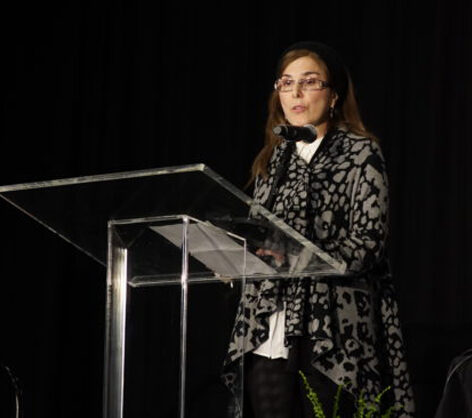
Share On Social!
Patricia Chalela has always loved working in public health and being a valuable member of a team.
Chalela is an associate professor at the Institute for Health Promotion Research (IHPR) at UT Health San Antonio. Here she is an integral part of a team that studies how texting helps people quit smoking, trains students in research methods, and is learning the ins and outs of Latino cancer.
Whatever the task, she is happy to help find ways to promote health in the Latino community, which suffers high rates of several diseases and cancer types.
“I love what I do and I love to work with this team to make a difference for Latinos. It has been an amazing ride, really very rewarding,” Chalela said.
A Colombian Immigrant Who Came to Texas
Chalela was born in Colombia to a Lebanese father and Colombian mother.
Throughout her life, education was always important to Chalela and her family.
After receiving her bachelor’s degree in community health in Colombia, Chalela studied community eye health in London.
“Once I studied community eye health, one of my first jobs when I came back to Colombia was the director of the Community Eye Health Department at a clinic that grew a lot and became a medical center. And then I became the director of the Preventive Medicine Department over there,” Chalela said.
Chalela first met Dr. Amelie Ramirez, director of Salud America! and the Institute for Health Promotion Research (IHPR), after doing a 3-month internship with the Pan American Health Organization (PAHO) in 1991.
“Dr. Ramirez, at that time, was at South Texas Health Research Center. I stayed there three months, and I guess she saw something in me. I said, ‘I really want to get my master’s degree in public health. Love public health.’ So she said, ‘Well, if you apply and you pass, I’ll give you a job,’” Chalela said.
And so she did just that.
Chalela applied for a job at the South Texas Health Research Center, was accepted, and came back to the United States to pursue her master’s degree in public health. She earned her master’s degree, and eventually a doctorate in public health, focusing on health promotion and epidemiology.
Chalela is thankful for the support and opportunity from Ramirez.
“She gave me a part time job, so I was able to finish my master’s degree in one year with her support. She had been my mentor and I cannot be more grateful for that,” Chalela said.
But because of her J-1 visa, Chalela had to return to Colombia for two years as soon as she finished her master’s program.
“While I was doing my work for the Preventative Medicine Department with the medical center in Colombia, I received a call from Dr. Ramirez. She told me, ‘I am with Baylor College of Medicine now. I would like you to work with me. Are you still interested in your doctorate degree?’ I said, ‘Yes, of course I am!’” Chalela said.
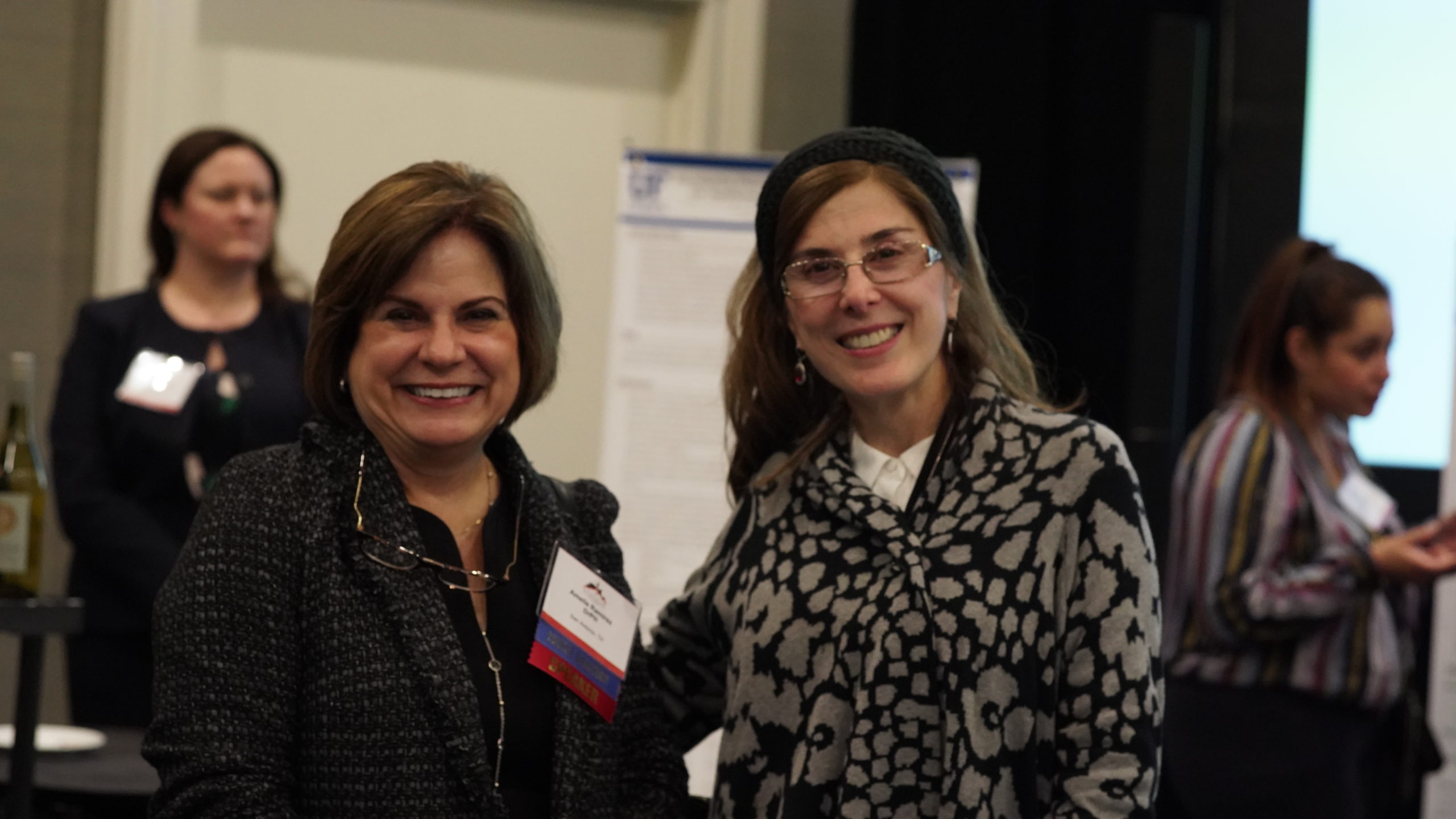
Ramirez held the position for Chalela until she was able to finish her required two years of work in Colombia.
Once she was able to return, Chalela worked alongside Ramirez at Baylor College of Medicine.
When Dr. Ramirez moved to UT Health San Antonio to launch the IHPR in 2006, Chalela came to the university, too.
Despite the job location change, Chalela remained in Houston, where her personal life and family were based.
“With technology, I have been able to do my job efficiently and continue with webinars, supervising students, my personnel, everything. And I commute every month, or as frequently as needed,” Chalela said.
Chalela’s Current Research in Latino Health Promotion
Chalela’s work and expertise is in social and behavioral sciences, health communications, and promotion and health disparities research.
“My main research interests are also in chronic disease prevention and control, particularly the role of epidemiological, environmental, and behavioral factors on health and disease with emphasis in the Latino population,” Chalela said.
Currently, Chalela is co-leading several projects and studies.
“Among others, I am a co-leading the use of mobile technology to improve adherence to endocrine hormonal therapy among breast cancer patients, where we created a phone application,” Chalela said.
Chalela and Ramirez have created a bilingual, culturally relevant phone app and navigation services to help local breast cancer patients stick with their prescribed therapy.
They plan to test the app with breast cancer patients at the Mays Cancer Center at UT Health San Antonio soon, after facing delays due to the COVID-19 pandemic.
Another current project for Chalela is Quitxt, bilingual service for smartphones that sends messages via text or Facebook Messenger to help coach and encourage people to quit smoking.
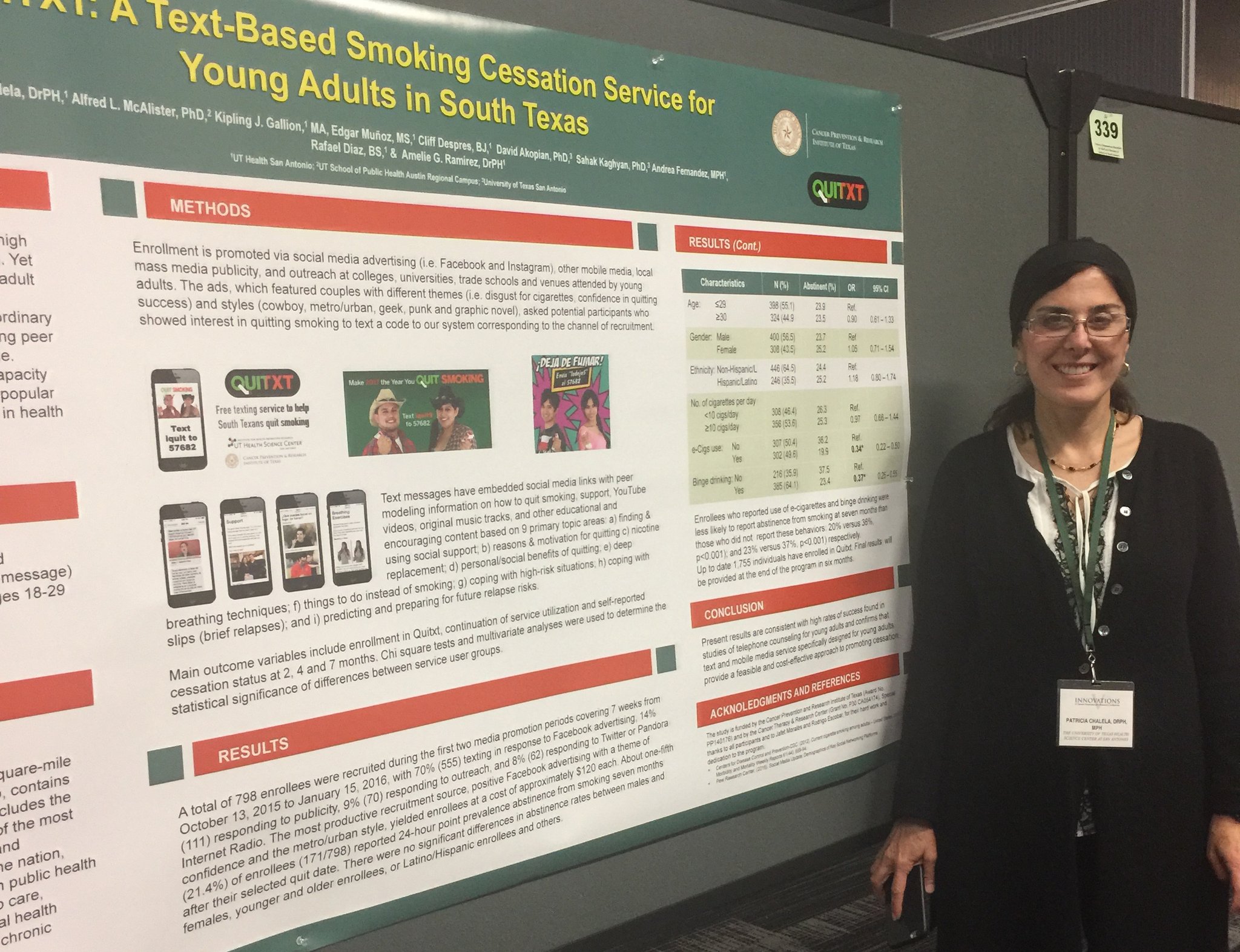
“The most recent phase of the Quitxt program is that we just launched the program for the Primary Care Center. Once we have about three to four months on both platforms, with the text messaging and the Facebook Messenger chat working properly, then we will implement the program at the Mays Cancer Center. So we are also very excited about that,” Chalela said.
Chalela is proud of how much the Quitxt program, led by Ramirez and funded by the Cancer Prevention and Research Institute of Texas, has grown.
“In the phase one of Quitxt, we started it aiming only at young adult Latino smokers in South Texas, and only text messaging. At the end of the program, we conducted the analysis of 798 participants, and we found that 21% were smoke free at seven months. So that was a big succes,” Chalela said.
“Thanks to that, we received two additional awards. So in the second phase of the program, we expanded our reach not only to young adult Latinos but also to non-Latino whites and African American young adult smokers living in low-income areas and rural areas in Texas. In the third phase, we are adapting the text messaging and the Facebook Messenger chat protocols to the patient population of the Primary Care Center and the Mays Cancer Center.”
The Quitxt program is very user friendly, especially on Facebook Messenger.
“The protocol was adapted for the Facebook Messenger chat that is more user-friendly. When we ask questions, the participant doesn’t have to text back, just select the option that best fits their situation. And it allows us to include more graphic content, which is also more appealing for everybody. It looks nice,” Chalela said.
The addition of the Facebook Messenger chat and subsequent relaunch in 2020 showed great success for Quitxt.
Chalela and her team were expecting around 300 responses but ended up receiving over 2,300 just in the initial weeks of recruitment. Since then, they’ve enrolled more than 7,000 participants.
“And the majority of participants are Spanish speaking which is telling us that we are really meeting a need for a tailored, appropriate translation service for this population,” she said.
Chalela also is an investigator on Ramirez’s program to create Latino-focused recruitment strategies and systems for cancer and Alzheimer’s clinical trials. This work is supported by a grant from Genentech, a member of the Roche Group.
“Our new project will allow us to use culturally relevant digital health communications, advocacy networks, and clinical partnerships to promote health equity and advance clinical trials for cancer treatment and Alzheimer’s disease among Latinos,” Chalela said.
Besides the main programs she co-leads, Chalela also helps promote the internship program at IHPR.
Although the program is on-hold due to COVID-19, Chalela has plans to revamp the internship website and include testimonials from previous students, as in the internship booklet.
“We developed an internship booklet and instruments to assess the program, try to keep track of the interns to see how they are doing. From the internship, they move to higher education, for example. Mentoring students and young colleagues has been very rewarding to me. It’s something that I really like. Trying to guide them and help them get the skills to become high-quality professionals,” Chalela said.
Chalela credits her success to her excellent coworkers and leader.
We are part of a high-quality research team with a great leader to study the causes and solutions of Latino health disparities in our research. I think our personnel, our staff, our associates are the best asset that we have,” Chalela said.
Chalela’s Challenges in Her Career in Latino Health Promotion
One of the most difficult aspects of Chalela’s job was being away from her family when she first moved to the U.S. She’s thankful that her research team has made it easier over time, especially when staff turnover happens and more hands are needed on projects.
“I have honestly had the privilege to be part of a research team that is caring, that is cohesive. And from the beginning they made me feel welcome. We support each other to advance our programs whenever we need support. For example, we can share our personnel. If we have a research coordinator or need to provide support to other programs, we do that, or if I have research interns that can support other activities, we will gladly do that. So that’s why I am still with this research team.
Another challenge she faces is not living in San Antonio. But with virtual meetings and online communication, they make it work.
“Not living in San Antonio is a challenge for me. Because of course it would be ideal for me to be all the time at the office. But the technology has allowed me to work from home, keep close communication with the team and with the students, keeping the productivity high and moving all the programs forward,” Chalela said.
Future Research in Latino Health Promotion for Chalela
In the future, Chalela hopes to continue her work in reducing health disparities for Latinos.
One new opportunity will be a research collaboration with the University of Miami.
“We are being awarded a survivorship grant in collaboration with the University of Miami. It is called ‘Avanzando Caminos’ – leading pathways. It’s the Hispanic/Latino cancer survivorship cohort. It is something that was missing, and we hope to address critical gaps in the science of Hispanic and Latino survivorship,” Chalela said.
Chalela also wants to keep using technology in her studies, like in the Quitxt program.
“I would like to continue involving new technology, new communication, social media, into the research studies that we do. Of course, it depends on the audience, the population that we want to reach,” Chalela said.
She looks forward to continuing the collaboration with her colleagues.
“All the successes I have, and we have at IHPR, is not the result of one person. It’s the team. We have a fantastic team,” Chalela said. “Thanks to them, to the passion that they have, the dedication that they have, all the accomplishments have been possible. So this is not one person, it is really a team effort and I love that.”
By The Numbers
44
million
immigrants live in the United States
This success story was produced by Salud America! with support from the Robert Wood Johnson Foundation.
The stories are intended for educational and informative purposes. References to specific policymakers, individuals, schools, policies, or companies have been included solely to advance these purposes and do not constitute an endorsement, sponsorship, or recommendation. Stories are based on and told by real community members and are the opinions and views of the individuals whose stories are told. Organization and activities described were not supported by Salud America! or the Robert Wood Johnson Foundation and do not necessarily represent the views of Salud America! or the Robert Wood Johnson Foundation.

